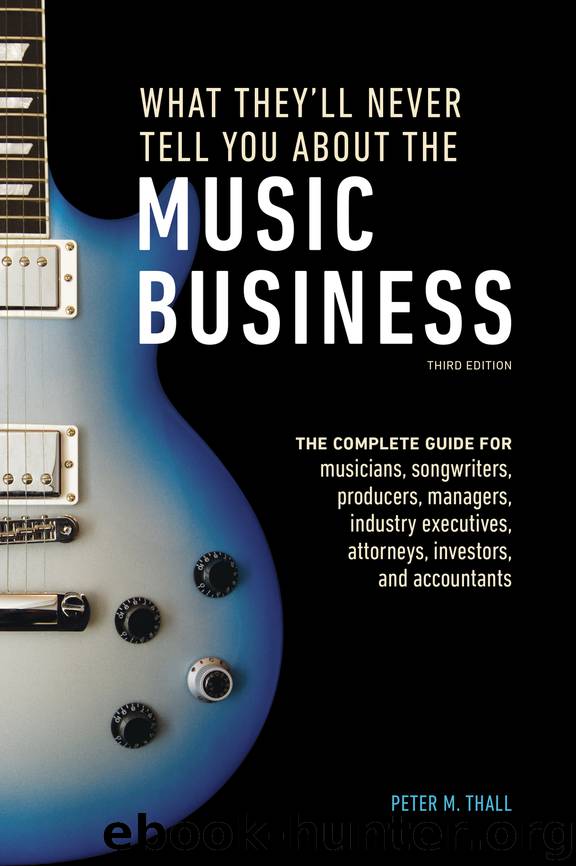What They'll Never Tell You About the Music Business by Peter M. Thall

Author:Peter M. Thall
Language: eng
Format: epub
Publisher: Potter/TenSpeed/Harmony
Published: 2016-08-23T04:00:00+00:00
Trademarks
The laws and cases regarding trademark protection are complex. Trademarks are not like copyrights; once you acquire or create a copyright, it stays with you practically forever, no matter what you do (or do not do). In contrast, you can lose—through misuse or even nonuse—a trademark. Music business lawyers usually refer trademark legal work to others who live and breathe it daily and who read up on the latest changes regularly. Large law firms, including large entertainment law firms, have trademark specialists. There is a body of law in the area of trademark that establishes that a trademark owner must maintain almost absolute control of the reproduction of the owner’s marks; failure to do this may result in losing the federal, and possibly state, protection that has been acquired through years of use and official trademark registrations.
This issue becomes concrete when an artist sublicenses his or her name, likeness, logos, trade names, and trademarks either directly or, through a merchandise “guru,” to a variety of third parties. Mere approval by the trademark owner of these licensees is not enough to establish the kind of control that the law requires. The artist, either directly or through an agent, must have total control over the manner in which the trademark is reproduced, the quality of the reproduction, and the manner in which the trademark is used.
Once a licensee misuses an artist’s trademark, if the artist does not take significant steps to cause the error to be corrected, the artist’s trademark may be in real jeopardy. If the artist has been careless in monitoring the use of the trademark, or if he or she, or a licensee, uses it in a manner that, under trademark law, can divest the artist of his or her rights, it may not be possible to stop a third, unauthorized, party from using the trademark, and this party will raise the defense that the artist has abandoned the trademark. The culprit will claim that he or she can continue selling the product and will be exempt from infringement claims and all of the attendant liabilities that infringers can suffer. An example might be when an unrelated, and unauthorized, third party manufacturers and distributes a coffee mug with a Rolling Stones “tongue” or a Prince “no name” symbol. As with other clauses in entertainment-related contracts, merely identifying the issue and requiring control over the use of one’s trademarks is not enough. Someone must be put in charge of, and be held responsible for, ensuring that those steps that are necessary to protect the marks be taken, and taken consistently over the course of the term of the merchandising agreement.
In the area of trademark protection, one of the parties from whom the artist should be protected is, ironically, his or her own merchandiser. It is wise to put into the merchandise contract a provision that ensures that the trademarks, trade names, copyrights, and other intellectual property rights of the artist will not be disputed or attacked at any time by
Download
This site does not store any files on its server. We only index and link to content provided by other sites. Please contact the content providers to delete copyright contents if any and email us, we'll remove relevant links or contents immediately.
The Goal (Off-Campus #4) by Elle Kennedy(12433)
Kathy Andrews Collection by Kathy Andrews(10519)
Diary of a Player by Brad Paisley(6866)
What Does This Button Do? by Bruce Dickinson(5527)
Assassin’s Fate by Robin Hobb(5236)
Big Little Lies by Liane Moriarty(4880)
Pale Blue Dot by Carl Sagan(4001)
Sticky Fingers by Joe Hagan(3454)
The Heroin Diaries by Nikki Sixx(2931)
The Death of the Heart by Elizabeth Bowen(2901)
Beneath These Shadows by Meghan March(2718)
The Help by Kathryn Stockett(2704)
Confessions of a Video Vixen by Karrine Steffans(2674)
How Music Works by David Byrne(2525)
Jam by Jam (epub)(2489)
Harry Potter 4 - Harry Potter and The Goblet of Fire by J.K.Rowling(2416)
Strange Fascination: David Bowie: The Definitive Story by David Buckley(2367)
Petty: The Biography by Warren Zanes(2237)
Darker Than the Deepest Sea by Trevor Dann(2206)
